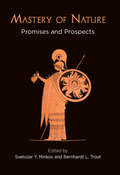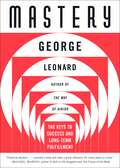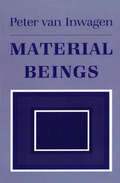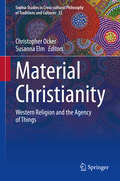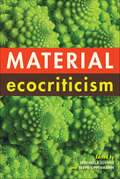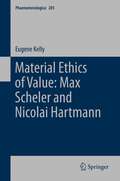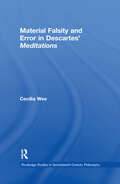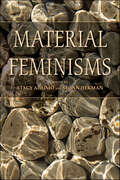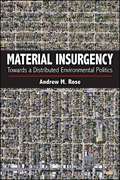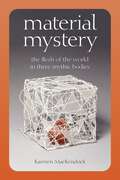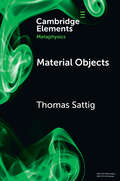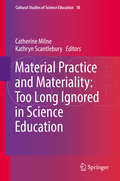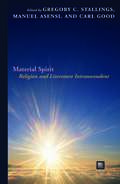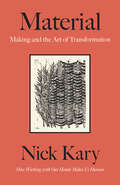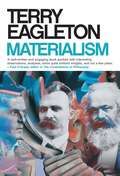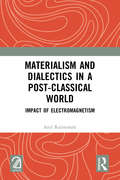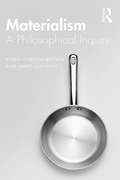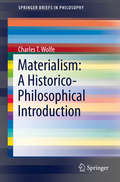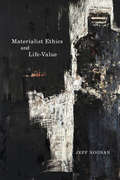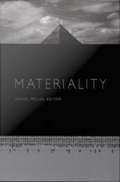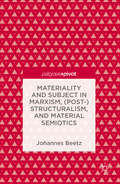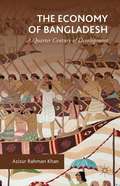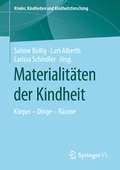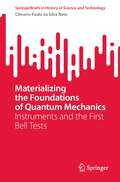- Table View
- List View
Mastery of Nature: Promises and Prospects
by Svetozar Y. Minkov Bernhardt L. TroutIn the early modern period, thinkers began to suggest that philosophy abjure the ideal of dispassionate contemplation of the natural world in favor of a more practically minded project that aimed to make human beings masters and possessors of nature. Humanity would seize control of its own fate and overthrow the rule by hostile natural or imaginary forces. The gradual spread of liberal democratic government, the Enlightenment, and the rise of technological modernity are to a considerable extent the fruits of this early modern shift in intellectual concern and focus. But these long-term trends have also brought unintended consequences in their wake as the dynamic forces of social reason, historical progress, and the continued recalcitrance of the natural world have combined to disillusion humans of the possibility—even the desirability—of their mastery over nature.The essays in Mastery of Nature constitute an extensive analysis of the fundamental aspects of the human grasp of nature. What is the foundation and motive of the modern project in the first place? What kind of a world did its early advocates hope to bring about? Contributors not only examine the foundational theories espoused by early modern thinkers such as Machiavelli, Bacon, Descartes, and Hobbes but also explore the criticisms and corrections that appeared in the works of Rousseau, Kant, Nietzsche, and Heidegger. Ranging from ancient Greek thought to contemporary quantum mechanics, Mastery of Nature investigates to what extent nature can be conquered to further human ends and to what extent such mastery is compatible with human flourishing.Contributors: Robert C. Bartlett, Mark Blitz, Daniel A. Doneson, Michael A. Gillespie, Ralph Lerner, Paul Ludwig, Harvey C. Mansfield, Arthur Melzer, Svetozar Y. Minkov, Christopher Nadon, Diana J. Schaub, Adam Schulman, Devin Stauffer, Bernhardt L. Trout, Lise van Boxel, Richard Velkley, Stuart D. Warner, Jerry Weinberger.
Mastery: The Keys to Success and Long-Term Fulfillment
by George Leonard"The practical wisdom in George Leonard's book will have a great influence for many years to come."—Michael Murphy, author of Golf in the Kingdom and The Future of the BodyDrawing on Zen philosophy and his expertise in the martial art of aikido, bestselling author Gorge Leonard shows how the process of mastery can help us attain a higher level of excellence and a deeper sense of satisfaction and fulfillment in our daily lives. Whether you're seeking to improve your career or your intimate relationships, increase self-esteem or create harmony within yourself, this inspiring prescriptive guide will help you master anything you choose and achive success in all areas of your life.In Mastery, you'll discover: • The 5 Essential Keys to Mastery • Tools for Mastery • How to Master Your Athletic Potential • The 3 Personality Types That Are Obstacles to Mastery • How to Avoid Pitfalls Along the Path. . . and more
Material Beings
by Peter Van Inwagen03 According to Peter van Inwagen, visible inanimate objects do not, strictly speaking, exist. In defending this controversial thesis, he offers fresh insights on such topics as personal identity, commonsense belief, existence over time, the phenomenon of vagueness, and the relation between metaphysics and ordinary language
Material Christianity: Western Religion and the Agency of Things (Sophia Studies in Cross-cultural Philosophy of Traditions and Cultures #32)
by Susanna Elm Christopher OckerThis collection of essays offers a series of rigorously focused art-historical, historical, and philosophical studies that examine ways in which materiality has posed and still poses a religious and cultural problem. The volume examines the material agency of objects, artifacts, and environments: art, ritual, pilgrimage, food, and philosophy. It studies the variable "senses” of materiality, the place of materiality in the formation of modern Western religion, and its role in Christianity’s dialogue with non-Western religions. The essays present new interpretations of religious rites and outlooks through the focus on their material components. They also suggest how material engagement theory - a new movement in cultural anthropology and archeology - may shed light on the cultural history of Christianity in medieval and early modern Europe and the Americas. It thus fills an important lacuna in the study of western religion by highlighting the longue durée, from the Middles Ages to the Modern Period, of a current dilemma, namely the divide between materialistic and what might broadly be called hermeneutical or cultural-critical approaches to religion and human subjectivity.
Material Ecocriticism
by Serenella Iovino Serpil OppermannMaterial Ecocriticism offers new ways to analyze language and reality, human and nonhuman life, mind and matter, without falling into well-worn paths of thinking. Bringing ecocriticism closer to the material turn, the contributions to this landmark volume focus on material forces and substances, the agency of things, processes, narratives and stories, and making meaning out of the world. This broad-ranging reflection on contemporary human experience and expression provokes new understandings of the planet to which we are intimately connected.
Material Ethics of Value: Max Scheler and Nicolai Hartmann
by E. KellyMax Scheler and Nicolai Hartmann developed ethics upon a phenomenological basis. This volume demonstrates that their contributions to a material ethics of value are complementary: by supplementing the work of one with that of the other, we obtain a comprehensive and defensible axiological and moral theory. By "phenomenology," we refer to an intuitive procedure that attempts to describe thematically the insights into essences, or the meaning-elements of judgments, that underlie and make possible our conscious awareness of a world and the evaluative judgments we make of the objects and persons we encounter in the world.
Material Falsity and Error in Descartes' Meditations (Routledge Studies in Seventeenth-Century Philosophy)
by Cecilia WeeMaterial Falsity and Error in Descartes’s Meditations approaches Descartes’s Meditations as an intellectual journey, wherein Descartes’s views develop and change as he makes new discoveries about self, God and matter. The first book to focus closely on Descartes’s notion of material falsity, it shows how Descartes’s account of material falsity – and correspondingly his account of crucial notions such as truth, falsehood and error – evolves according to the epistemic advances in the Meditations. It also offers important new insights on the crucial role of Descartes’s Third Meditation discussion of material falsity in advancing many subsequent arguments in the Meditations. This book is essential reading for those working on Descartes and early modern philosophy. It presents an independent reading on issues of perennial interest, such as Descartes’s views on error, truth and falsehood. It also makes important contributions to topics that have been the focus of much recent scholarship, such as Descartes’s ethics and his theodicy. Those working on the interface between medieval and modern philosophy will find the discussions on Descartes’s debt to predecessors like Suárez and Augustine invaluable.
Material Feminisms
by Stacy Alaimo & Susan HekmanHarnessing the energy of provocative theories generated by recent understandings of the human body, the natural world, and the material world, Material Feminisms presents an entirely new way for feminists to conceive of the question of materiality. In lively and timely essays, an international group of feminist thinkers challenges the assumptions and norms that have previously defined studies about the body. These wide-ranging essays grapple with topics such as the material reality of race, the significance of sexual difference, the impact of disability experience, and the complex interaction between nature and culture in traumatic events such as Hurricane Katrina. By insisting on the importance of materiality, this volume breaks new ground in philosophy, feminist theory, cultural studies, science studies, and other fields where the body and nature collide.
Material Insurgency: Towards a Distributed Environmental Politics (SUNY series in New Political Science)
by Andrew M. RoseIn Material Insurgency, Andrew M. Rose examines emerging new materialist and posthuman conceptions of subjectivity and agency and explores their increasing significance for contemporary climate change environmentalism. Working at the intersection of material ecocriticism, posthuman theory, and environmental political theory, Rose critically focuses on the ways social movement organizing might effectively operate within the context of distributed agency. This concept undoes the privileging of rational human actors to suggest agency is better understood as a complex mixture of human and nonhuman forces. Rose explores various representations of distributed agency, from the pipeline politics of the Keystone XL campaign to the speculative literary fiction of Leslie Marmon Silko and Kim Stanley Robinson. Each of these cultural and literary texts provides a window into the possible constitution of a (distributed) environmental politics that does not yet exist and operates as a resource for envisioning environmental actors we cannot necessarily study empirically, because they are still only a prospect, or potential, of our imagination.
Material Mystery: The Flesh of the World in Three Mythic Bodies
by Karmen MacKendrickMaterial Mystery considers three apparently anthropocentric myths that are central to Abrahamic religions—those of the primal human, the incarnated and possibly divine redeemer, and the resurrected body. At first glance, these stories reinforce a human-centered theology and point to a very anthropomorphic God. Taking them seriously seems to ignore the material turn in the humanities entirely, with the same sort of willful ignorance that some of our politicians show in declaring that their myths count as facts, or that the point of the rest of the world is to further human consumption. But it is possible, Karmen MacKendrick shows, to read these figures through a particular tradition that emerges from the Hebrew Bible, the tradition of Wisdom as a creative force. Wisdom texts are common across the ancient Near East. As the idea of creative Wisdom develops from antiquity into the middle ages, it gathers philosophical influences from a range of philosophical traditions. This exuberantly promiscuous impurity—intellectual, artistic, and theological—generates new interpretive possibilities. In these interpretations, each human-like figure opens up onto the world''s matter, as an interdependent part of it, and matter is thoroughly mixed with divinity. Such mythic readings complement our factual, scientific understanding of the material world, to engage wider kinds of knowing and affective attention—particularly Wisdom''s combination of care and delight.
Material Objects (Elements in Metaphysics)
by Thomas SattigThis Element is a survey of central topics in the metaphysics of material objects. The topics are grouped into four problem spaces. The first concerns how an object's parts are related to the object's existence and to the object's nature, or essence. The second concerns how an object persists through time, how an object is located in spacetime, and how an object changes. The third concerns paradoxes about objects, including paradoxes of coincidence, paradoxes of fission, and the problem of the many. The fourth concerns views with radical consequences regarding the existence of composite material objects, including mereological nihilism, ontological anti-realism, and deflationism.
Material Practice and Materiality: Too Long Ignored in Science Education (Cultural Studies of Science Education #18)
by Kathryn Scantlebury Catherine MilneIn this book various scholars explore the material in science and science education and its role in scientific practice, such as those practices that are key to the curriculum focuses of science education programs in a number of countries.As a construct, culture can be understood as material and social practice. This definition is useful for informing researchers' nuanced explorations of the nature of science and inclusive decisions about the practice of science education (Sewell, 1999). As fields of material social practice and worlds of meaning, cultures are contradictory, contested, and weakly bounded. The notion of culture as material social practices leads researchers to accept that material practice is as important as conceptual development (social practice).However, in education and science education there is a tendency to ignore material practice and to focus on social practice with language as the arbiter of such social practice. Often material practice, such as those associated with scientific instruments and other apparatus, is ignored with instruments understood as "inscription devices", conduits for language rather than sources of material culture in which scientists share “material other than words” (Baird, 2004, p. 7) when they communicate new knowledge and realities. While we do not ignore the role of language in science, we agree with Barad (2003) that perhaps language has too much power and with that power there seems a concomitant loss of interest in exploring how matter and machines (instruments) contribute to both ontology and epistemology in science and science education.
Material Spirit: Religion and Literature Intranscendent (Perspectives in Continental Philosophy)
by Manuel Asensi Carl GoodThe essays in this collection examine philosophical, religious, and literary or artistic texts using methodologies and insights that have grown out of reflection on literature and art. In them, them phrase “material spirit” becomes a point of departure for considering the continuing spectral effects of religious texts and concerns in ways that do not simply call for, or assume, new orrenewed forms of religiosity.The writers in this collection seek to examine religion beyond traditional notions of transcendence: Their topics range from early Christian religious practices to global climate change. Some of the essays explore religious themes or tones in literary texts, for example, works by Wordsworth, Hopkins, Proust, Woolf, and Teresa of Avila. Others approach—in a literarycriticalmood—philosophical or para-philosophical writers such as Bataille, Husserl, Derrida, and Benjamin. Still others treat writers of a more explicitly religious orientation, such as Augustine, Rosenzweig, or Bernard of Clairvaux.
Material: Making and the Art of Transformation
by Nick KaryA master craftsperson explores the ways in which working with our hands reveals the essence of both our humanity and our relationship with the natural, material world In our present age of computer-assisted design, mass production and machine precision, the traditional skills of the maker or craftsperson are hard to find. Yet the desire for well-made and beautiful objects from the hands (and mind) of a skilled artisan is just as present today as it ever has been. Whether the medium they work with is wood, metal, clay or something else, traditional makers are living links to the rich vein of knowledge and skills that defines our common human heritage. More than this, though, many of us harbor a deep and secret yearning to produce something – to build or shape, to imagine and create our own objects that are imbued not only with beauty and functionality, but with a story and, in essence, a spirit drawn from us. Nick Kary understands this yearning. For nearly four decades he has worked on commission to make fine, distinctive furniture and cabinets from wood, most of it sourced near his home, in the counties of South West England. During this time, he has been both a teacher and a student; one who is fascinated with the philosophy and practice of craft work of all kinds. In Material, Kary takes readers along with him to visit some of the places where modern artisans are preserving, and in some cases passing on, the old craft skills. His vivid descriptions and eye for detail make this book a rich and delightful read, and the natural and cultural history he imparts along the way provides an important context for understanding our own past and the roots of our industrial society. Personal, engaging, and filled with memorable people, landscapes and scenes, Material is a rich celebration of what it means to imagine and create, which in the end is the essence of being human, and native to a place. As Kary puts it, “Wood and words, trees and people, material and ethereal – it is here I love increasingly to dwell.”
Materialism
by Terry EagletonA brilliant introduction to the philosophical concept of materialism and its relevance to contemporary science and culture In this eye-opening, intellectually stimulating appreciation of a fascinating school of philosophy, Terry Eagleton makes a powerful argument that materialism is at the center of today's important scientific and cultural as well as philosophical debates. The author reveals entirely fresh ways of considering the values and beliefs of three very different materialists--Marx, Nietzsche, and Wittgenstein--drawing striking comparisons between their philosophies while reflecting on a wide array of topics, from ideology and history to language, ethics, and the aesthetic. Cogently demonstrating how it is our bodies and corporeal activity that make thought and consciousness possible, Eagleton's book is a valuable exposition on philosophic thought that strikes to the heart of how we think about ourselves and live in the world.
Materialism and Dialectics in a Post-classical World: Impact of Electromagnetism
by Anil RajimwaleEvolution of the concepts of atom and atomism, and the impact of electromagnetism on our worldview, is the object of our study in this book. Electromagnetism is the key link in the transition from classical to post-classical worldview. This transition is caused by the one from our thought based upon the tangibles to that based upon the intangibles. Electromagnetism inaugrated an era of light speeds and near it, and of the world constituted by such speeds. Philosophy and the worldview need to catch up and undergo a basic change. Atom as a concept and reality is under severe stress as explanation of reality. Reality has come out of atomic limits and unveiled a new world, which is constituted of quantum, relativity, wave/particle duality, etc. It is a challenge to philosophy, which re-fashioning to interpret the post-classical world based on rapid motions.We need to develop new concepts and bring about a realignment in various thought constituents. Rather thatn 'overthrow' matter, we are delving deeper into it. Philosophy and human thought itself stands on the brink of redefinition. In the present book the author shows how electromagnetism connects classical with post-classical thought, creating new structures, and impacting materialism and dialectics. Please note: Taylor & Francis does not sell or distribute the Hardback in India, Pakistan, Nepal, Bhutan, Bangladesh and Sri Lanka.
Materialism: A Historical and Philosophical Inquiry
by James Ladyman Robin Gordon BrownThe doctrine of materialism is one of the most controversial in the history of ideas. For much of its history it has been aligned with toleration and enlightened thinking, but it has also aroused strong, often violent, passions amongst both its opponents and proponents. This book explores the development of materialism in an engaging and thought-provoking way and defends the form it takes in the twenty-first century. Opening with an account of the ideas of some of the most important thinkers in the materialist tradition, including Epicurus, Lucretius, Hobbes, Hume, Darwin and Marx, the authors discuss materialism’s origins, as an early form of naturalistic explanation and as an intellectual outlook about life and the world in general. They explain how materialism’s beginnings as an imaginative vision of the true nature of things faced a major challenge from the physics it did so much to facilitate, which now portrays the microscopic world in a way incompatible with traditional materialism. Brown and Ladyman explain how out of this challenge materialism developed into the new doctrine of physicalism. Drawing on a wide range of colourful examples, the authors argue that although materialism does not have all the answers, its humanism and commitment to naturalistic explanation and the scientific method is our best philosophical hope in the ideological maelstrom of the modern world.
Materialism: A Historico-Philosophical Introduction
by Charles T. WolfeThis book provides an overview of key features of (philosophical) materialism, in historical perspective. It is, thus, a study in the history and philosophy of materialism, with a particular focus on the early modern and Enlightenment periods, leading into the 19th and 20th centuries. For it was in the 18th century that the word was first used by a philosopher (La Mettrie) to refer to himself. Prior to that, 'materialism' was a pejorative term, used for wicked thinkers, as a near-synonym to 'atheist', 'Spinozist' or the delightful 'Hobbist'. The book provides the different forms of materialism, particularly distinguished into claims about the material nature of the world and about the material nature of the mind, and then focus on materialist approaches to body and embodiment, selfhood, ethics, laws of nature, reductionism and determinism, and overall, its relationship to science. For materialism is often understood as a kind of philosophical facilitator of the sciences, and the author want to suggest that is not always the case. Materialism takes on different forms and guises in different historical, ideological and scientific contexts as well, and the author wants to do justice to that diversity. Figures discussed include Lucretius, Hobbes, Gassendi, Spinoza, Toland, Collins, La Mettrie, Diderot, d'Holbach and Priestley; Büchner, Bergson, J. J. C. Smart and D. M. Armstrong.
Materialist Ethics and Life-Value
by Jeff NoonanCurrent patterns of global economic activity are not only unsustainable, but unethical - this claim is central to Materialist Ethics and Life-Value. Grounding the definition of ethical value in the natural and social requirements of life-support and life-development shared by all human beings, Jeff Noonan provides a new way of understanding the universal conception of "the good life." Noonan argues that the true crisis affecting the world today is not sluggish rates of economic growth but the model of measuring economic and social health in terms of money-value. In response, he develops an alternative understanding of good societies where the breadth and depth of life-activity and enjoyment are dependent on dominant institutions. The more social institutions satisfy the necessary requirements of human life, the more they empower each person to develop and enjoy the capacities that make human life valuable and meaningful. A well-reasoned synthesis of traditional philosophical concerns and contemporary critiques of global capitalism, this book is a forward-looking treatise that defends political struggle and reconsiders what is most important for a happy life.
Materialist Ethics and Life-Value: Materialist Ethics And Life-value (McGill-Queen's Studies in the History of Ideas #56)
by Jeff NoonanCurrent patterns of global economic activity are not only unsustainable, but unethical - this claim is central to Materialist Ethics and Life-Value. Grounding the definition of ethical value in the natural and social requirements of life-support and life-development shared by all human beings, Jeff Noonan provides a new way of understanding the universal conception of "the good life." Noonan argues that the true crisis affecting the world today is not sluggish rates of economic growth but the model of measuring economic and social health in terms of money-value. In response, he develops an alternative understanding of good societies where the breadth and depth of life-activity and enjoyment are dependent on dominant institutions. The more social institutions satisfy the necessary requirements of human life, the more they empower each person to develop and enjoy the capacities that make human life valuable and meaningful. A well-reasoned synthesis of traditional philosophical concerns and contemporary critiques of global capitalism, this book is a forward-looking treatise that defends political struggle and reconsiders what is most important for a happy life.
Materiality
by Daniel MillerThroughout history and across social and cultural contexts, most systems of belief--whether religious or secular--have ascribed wisdom to those who see reality as that which transcends the merely material. Yet, as the studies collected here show, the immaterial is not easily separated from the material. Humans are defined, to an extraordinary degree, by their expressions of immaterial ideals through material forms. The essays in Materiality explore varied manifestations of materiality from ancient times to the present. In assessing the fundamental role of materiality in shaping humanity, they signal the need to decenter the social within social anthropology in order to make room for the material. Considering topics as diverse as theology, technology, finance, and art, the contributors--most of whom are anthropologists--examine the many different ways in which materiality has been understood and the consequences of these differences. Their case studies show that the latest forms of financial trading instruments can be compared with the oldest ideals of ancient Egypt, that the promise of software can be compared with an age-old desire for an unmediated relationship to divinity. Whether focusing on the theology of Islamic banking, Australian Aboriginal art, derivatives trading in Japan, or textiles that respond directly to their environment, each essay adds depth and nuance to the project that Materiality advances: a profound acknowledgment and rethinking of one of the basic properties of being human. Contributors. Matthew Engelke, Webb Keane, Susanne Kchler, Bill Maurer, Lynn Meskell, Daniel Miller, Hirokazu Miyazaki, Fred Myers, Christopher Pinney, Michael Rowlands, Nigel Thrift
Materiality and Subject in Marxism, (Post-)Structuralism, and Material Semiotics
by Johannes BeetzThis clear and concise book investigates the relation between materiality and the subject in Marxism, (post-)structuralism, and material semiotics. It introduces the three approaches in an accessible way and serves as an introduction to different kinds of materialism and theories of the subject. For each approach, the modalities of materiality of the respective materialism are defined and the relationship between these multiple materialities and the subject are presented as specific to the theoretical approaches discussed. Beetz argues for a non-reductionist materialism, which conceives of materiality as more than matter or matter in motion. In such a materialism the subject is seen as an effect of material conditions, relations, processes, and practices. He shows how the constitution and decentering of the subject is conceptualized in the approaches presented and highlights the role of material instances in these processes.
Materiality, Rules and Regulation: New Trends in Management and Organization Studies (Technology, Work and Globalization)
by Nathalie Mitev François-Xavier de Vaujany Anouk Mukherjee Giovan LanzaraMateriality, Rules and Regulation: New Trend in Management and Organization Studies concentrates on the relationship of rules and regulation to the materiality of artefacts, practices, and organizations. It combines the recent scholarly interest on sociomateriality with a focus on regulation and rules.
Materialitäten der Kindheit: Körper – Dinge – Räume (Kinder, Kindheiten und Kindheitsforschung #22)
by Larissa Schindler Lars Alberth Sabine BolligDer Band fasst aktuelle Theorieperspektiven und Forschungsbefunde zur Bedeutung von Körpern, Objekten und Räumen in der interdisziplinären Kindheitsforschung zusammen. Es wird gezeigt, in welchem Maße diese Materialitäten daran mitwirken, dass sich bestimmte gesellschaftliche Kindheitsmuster und -erfahrungen ausbilden und wie material die Positionierungs- und Subjektivierungsprozesse von Kindern als Kinder gedacht werden müssen.
Materializing the Foundations of Quantum Mechanics: Instruments and the First Bell Tests (SpringerBriefs in History of Science and Technology)
by Climério Paulo da Silva NetoThis book offers a history of the instrumentation used to materialize the early thought experiments devised in the Einstein-Bohr disputes over the foundations of quantum mechanics. It shows how the second world war and cold war fostered the development of materials, instruments, and systems that made it possible to create, manipulate, and detect single quantum systems, thus creating the material conditions for experiments in foundations of quantum mechanics and for a broad spectrum of experimental inquiries on the structure and properties of matter which underlay the creation of new research fields such as quantum optics, quantum information, and atomic, molecular, and optical physics. Discussing research and development performed in diverse contexts, this book reveals how physicists carried instruments, and the knowledge they embodied, through disciplinary and geographic frontiers to probe entanglement, a most intriguing feature of the quantum world.
